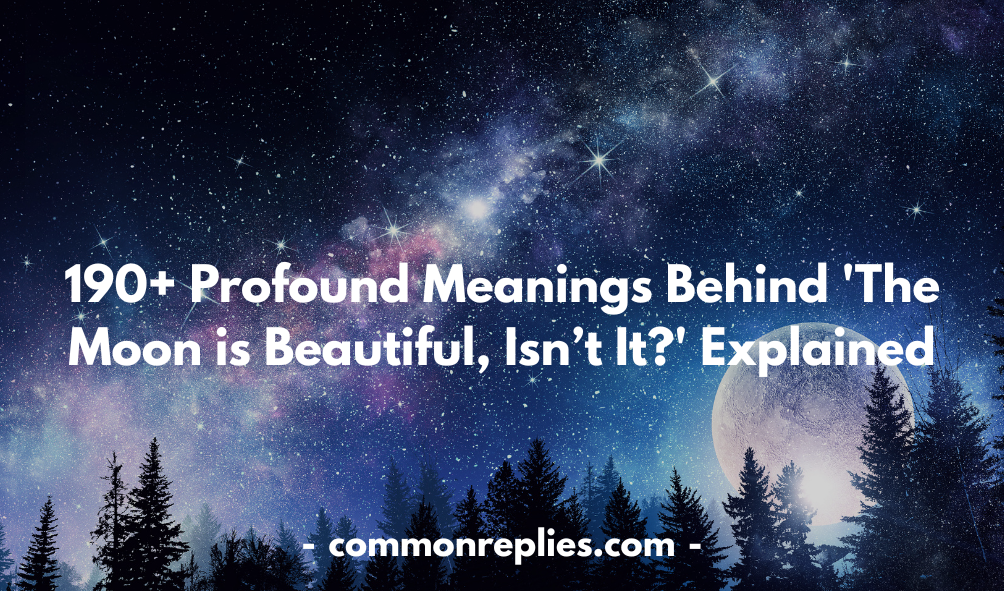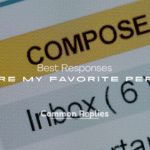Have you ever heard someone say, “The moon is beautiful, isn’t it?” and felt like there was something more behind it? Like maybe they weren’t just commenting on the night sky?
Well, you were probably right.
This simple yet poetic phrase carries a deeply emotional weight, especially when seen through the lens of Japanese culture. Let’s dig into “the moon is beautiful isn’t it meaning” and explore why such a seemingly ordinary sentence can be one of the most romantic expressions of love ever whispered.
Literary Origins of the Phrase
- “It’s incredible how a simple moonlit phrase became one of the most poetic love lines in literature.”
- “Sōseki truly had a way with words—his take on romance was so subtle, yet so powerful.”
- “It’s beautiful how this expression captures love without ever saying ‘I love you’.”
- “I never realized how much weight a single metaphor could carry until I read about this phrase.”
- “It’s like reading between the lines of a haiku—short, soft, but emotionally deep.”
- “Such a literary twist! Who knew confessing love could sound so poetic?”
- “It feels like the moon became a character itself in a silent love story.”
- “The way Sōseki translated emotions into natural beauty is just genius.”
- “This phrase is a reminder of how language and literature shape how we express love.”
- “Honestly, it’s more romantic than any modern love confession I’ve ever heard.”
Cultural Significance in Japan
- “It says a lot about Japanese culture—how they value subtlety over bluntness.”
- “This phrase really shows the Japanese love for beauty, nature, and quiet emotion.”
- “I love how Japanese expressions focus more on feeling than saying things outright.”
- “It’s amazing how a culture can pack so much emotion into such a short sentence.”
- “It’s not just about the moon—it’s about the way love is understood in Japan.”
- “Even silence has meaning in Japanese communication, and this phrase proves that.”
- “Japan has a way of turning even everyday moments into poetry.”
- “Understanding this expression makes me appreciate Japanese art and culture more.”
- “I wish more cultures expressed love this gracefully.”
- “This is why I’ve always admired Japanese storytelling—it’s full of layered meanings.”
Romantic Interpretations and Confessions
- “Honestly, if someone said this to me, I’d melt on the spot.”
- “It’s such a beautiful way to say ‘I love you’ without the awkwardness.”
- “If someone told me ‘the moon is beautiful, isn’t it?’ I’d know exactly what they meant.”
- “This is the kind of love language I crave—sweet, simple, sincere.”
- “Way more meaningful than a generic ‘I love you’ text.”
- “It’s not just romantic—it’s deeply personal.”
- “This would be the perfect line for a quiet night walk under the stars.”
- “Imagine hearing this from someone you secretly love. It would hit different.”
- “The moon sees our feelings even when we don’t say them out loud.”
- “It’s like a confession hidden in plain sight, waiting to be understood.”
Historical Context and Natsume Sōseki
- “I didn’t know Sōseki rewrote translations with such emotional depth.”
- “He really understood that language isn’t just about words—it’s about what you feel.”
- “It’s wild how a grammar lesson turned into a timeless romantic expression.”
- “Sōseki was ahead of his time—he turned a literal sentence into lyrical beauty.”
- “This makes me want to read more of his work. He clearly saw things differently.”
- “This moment in history was small, but it changed love language forever.”
- “So cool how one author’s perspective gave birth to such a symbolic phrase.”
- “Sōseki taught more than English—he taught how to express the heart.”
- “His interpretation shows just how emotionally rich the Japanese language can be.”
- “Now I get why people say literature can change the way we see the world.”
Hidden Emotions in Japanese Language
- “This phrase really shows how much is left unsaid in Japanese conversations.”
- “It’s like every sentence has a second meaning in Japanese.”
- “They don’t just talk—they imply, they feel, they gesture. It’s beautiful.”
- “The restraint is part of the emotion—it makes it feel more real.”
- “No wonder Japanese poetry is so deep—it’s in their way of speaking too.”
- “This is why Japanese confessions feel so intense—they’re rare and meaningful.”
- “The indirectness makes the emotion feel even more honest, somehow.”
- “You can feel the affection without needing flashy words.”
- “It makes me want to pay more attention to what’s not said in conversations.”
- “The hidden meanings turn every phrase into a mini love story.”
Modern Usage in Relationships
- “Not as beautiful as you.”
- “It is… but I think this moment is even more.”
- “Every time I see it, I think of you.”
- “Yeah… it reminds me how lucky I am to have you.”
- “It’s beautiful, but your smile outshines it.”
- “You always say that when you’re trying to be romantic.”
- “It is. Nights like these feel magical with you.”
- “I’d rather look at you.”
- “Are you trying to tell me something?”
- “So is this your way of saying ‘I love you’ again?”
Anime and Pop Culture References
- “Just like in that scene from ‘Your Name’, right?”
- “Wow, that’s some serious Studio Ghibli energy.”
- “You sound like an anime protagonist right now.”
- “And here I thought you were gonna go full Sailor Moon on me.”
- “Did you just quote a confession scene?”
- “You really think you’re in a shoujo anime, don’t you?”
- “Only if we’re the main characters.”
- “Next you’ll say something poetic with cherry blossoms falling.”
- “Okay, Tsukino Usagi. What’s next?”
- “So… we’re officially in the opening theme now, huh?”

Linguistic Nuances and Indirect Communication
- “Ah, the classic Japanese way to confess, huh?”
- “Are you speaking in code again?”
- “You mean ‘I love you’, don’t you?”
- “That’s a very elegant way to say something deeper.”
- “So subtle, yet it speaks volumes.”
- “I’ve read that means more than it sounds.”
- “A beautiful way to avoid the obvious.”
- “It’s like poetry between the lines.”
- “I see what you did there… and I feel the same.”
- “I admire how Japanese language hides emotion in beauty.”
Emotional Responses and Their Meanings
- “It’s peaceful. Makes me feel close to you.”
- “Something about it makes my heart ache a little—in a good way.”
- “It makes me miss things I never had.”
- “It’s the kind of beauty that makes me want to hold your hand.”
- “Why does something so distant feel so familiar?”
- “It’s calming… like your presence.”
- “It makes me believe in love a little more.”
- “That moon… feels like it’s watching over us.”
- “It’s beautiful, and kind of bittersweet.”
- “The moon’s beautiful—and so is the way I feel right now.”
Symbolism of the Moon in Literature
- “It’s the eternal muse, always watching, always inspiring.”
- “Just like in haiku—it captures silence and longing.”
- “Writers say the moon reflects the soul… maybe that’s why I can’t stop staring.”
- “Poe, Neruda, and now us under the same moon.”
- “There’s always a little sadness in the moon’s glow, don’t you think?”
- “Literature always gives the moon a voice. Tonight, it speaks of love.”
- “It’s been a symbol of secrets, and now it’s ours.”
- “Shakespeare would’ve written a sonnet for this moon.”
- “The moon has seen every kind of love story. Maybe it’s blessing ours.”
- “I get why poets are obsessed. It says everything without saying a word.”
Impact on Internet and Social Media Trends
- “I saw that tweet and instantly felt like someone whispered a love poem to me.”
- “This phrase is like the softest way to shoot your shot online.”
- “TikTok needs to do a filter just for people to respond with this line—it’s iconic.”
- “Who knew one poetic sentence could go so viral and still stay romantic?”
- “It’s wild how this one line is turning everyone into secret romantics.”
- “Instagram captions have never been more poetic since this trend started.”
- “Every time someone posts a night sky pic, someone always comments this—it’s a vibe now.”
- “It’s giving soft-launch confession energy.”
- “This phrase deserves its own emoji by now, seriously.”
- “It’s like the modern-day love letter wrapped in a tweet.”
Usage in Films and Literature Globally
- “That line would fit perfectly in a Miyazaki film, whispered under starlight.”
- “Sounds like something a Jane Austen character would say but in Japanese.”
- “I could totally see this in a romantic scene in a Studio Ghibli movie.”
- “It’s the kind of thing a character says before they leave forever.”
- “Feels like an entire love story told in just one sentence—so cinematic.”
- “This belongs on the last page of a heartbreak novel.”
- “Reminds me of the subtle, powerful dialogues in Wong Kar Wai films.”
- “Imagine this in a period drama—uttered over a lantern-lit balcony.”
- “That line could carry a whole plot twist in a poetic indie film.”
- “It’s the perfect literary device to say ‘I love you’ without ever saying it.”
Psychological Impact of Poetic Language
- “This kind of phrase hits your heart before your brain can catch up.”
- “Isn’t it amazing how six words can unlock so many emotions?”
- “Poetic language bypasses logic and speaks straight to the soul.”
- “It softens the emotional blow—like love wearing silk gloves.”
- “It lets you feel something deeper without the fear of rejection.”
- “It leaves space for interpretation, and sometimes that’s more impactful.”
- “Subtlety in words makes the heart lean in closer.”
- “It creates emotional intimacy in such a non-threatening way.”
- “It evokes curiosity, not confrontation—perfect psychology.”
- “It’s like planting a seed in someone’s heart and letting them water it with thought.”
Expressing Love Without Saying “I Love You”
- “It’s like a love letter written in starlight.”
- “That’s the kind of phrase that says everything and nothing all at once.”
- “When you can’t say ‘I love you,’ you say this instead.”
- “It’s not just romantic—it’s respectful and gentle.”
- “Sometimes this kind of subtlety is even more powerful than ‘I love you.’”
- “It’s the emotionally intelligent way to confess feelings.”
- “You’re not saying it—you’re inviting the other person to feel it.”
- “It’s like asking someone, ‘Do you see what I see?’”
- “It’s perfect for soft-spoken souls who love deeply.”
- “You don’t need grand gestures when you’ve got a line like this.”
Why Subtlety Matters in Emotional Expression
- “Because not everyone is ready to hear ‘I love you’—but they can feel this.”
- “Subtlety lets you express without overwhelming.”
- “It gives the other person emotional room to respond naturally.”
- “Sometimes, less really is more when it comes to feelings.”
- “Whispered emotions carry farther than shouted ones.”
- “It’s about the art of saying it without saying it—pure elegance.”
- “Subtlety invites connection, not pressure.”
- “It builds emotional safety, especially for vulnerable hearts.”
- “A quiet confession like this can echo longer than loud declarations.”
- “True feelings don’t need volume—just sincerity.”
The Moon Is Beautiful, Isn’t It? in English and Other Languages
Translations That Lose the Magic
Try translating this into French, Spanish, or Chinese and it often loses that quiet emotional punch. In English, we’re used to direct expressions—this one teaches us the art of implication.
Can This Be Used in Other Cultures?
Absolutely! While it originated in Japan, the idea of poetic confessions exists everywhere. Think of:
- “Do you like jazz?” from romantic movies
- A shared look during a sunset
- Saying nothing, but meaning everything
You can adopt this phrase in any language—as long as the emotion is real.
The Phrase’s Impact on Modern Pop Culture
Anime, Novels, and Internet Memes
From anime scenes that tug at your heartstrings to TikTok trends and Tumblr posts, this phrase has entered the modern love lexicon. It’s become a symbol of quiet, soul-deep affection.
How It’s Romanticized in Modern Relationships
In a world of texts and DMs, a line like “the moon is beautiful, isn’t it?” stands out. It’s intimate, thoughtful, and carries old-school charm. It says: I care enough to say it differently.
Variants and Spin-Offs of the Phrase
“The Moon Tonight is Beautiful, Isn’t It?”
A slight twist that adds immediacy. It makes the phrase feel even more personal—like the moment is just for you and them.
Other Poetic Confessions Inspired by This Line
- “Your smile is my favorite view.”
- “I feel warm when you’re around, like the sun on a winter day.”
- “The stars are lucky to see you every night.”
These modern-day metaphors keep the tradition of subtle love alive.
Conclusion
So, what is the true meaning of “the moon is beautiful, isn’t it?” It’s about love—but more than that, it’s about understanding, intimacy, and emotion too big for plain words. It’s the art of saying more by saying less.
Whether you’re confessing your feelings or simply sharing a quiet moment, this poetic phrase reminds us of the beauty of subtlety—and how sometimes, the softest words leave the loudest echoes.
FAQs
1. What does “the moon is beautiful, isn’t it?” mean in love?
It’s a poetic way to say “I love you” without saying it directly. It’s all about emotional subtlety and shared feelings.
2. Is this phrase still used in Japan today?
While it’s not commonly spoken in everyday life, it’s often referenced in literature, anime, and modern romantic contexts.
3. How should I respond if someone says this to me?
Acknowledge the moment—either reciprocate the sentiment with a poetic reply or smile and appreciate the emotional depth behind it.
4. Can this phrase be used platonically?
Yes! While it’s often romantic, it can also express deep friendship, appreciation, or quiet emotional closeness.
5. Why is this phrase so popular online now?
Because it’s romantic, mysterious, and deeply emotional. In a world craving connection, subtle yet powerful phrases like this go viral.










